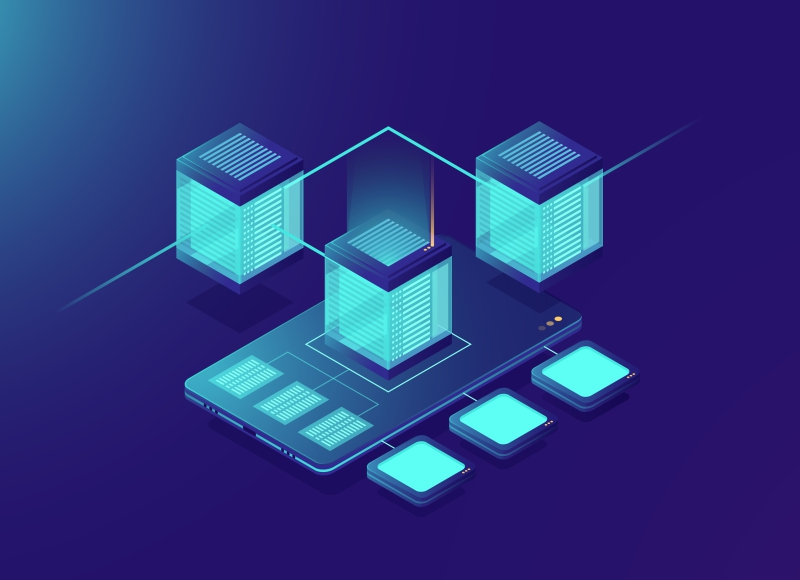Table of Contents
Dive into the world of blockchain development with our comprehensive guide. Explore the essential concepts, tools, and techniques to harness the power of this transformative technology.

Welcome to the indispensable guide on blockchain development! You're in the right place if you're a business leader or decision-maker keen to investigate how blockchain can transform the whole business cycle. We'll break down the intricacies of blockchain technique evolution, offer actionable tips, and highlight practical solutions demonstrating its full power.
Blockchain development revolutionizes industries by offering transparent, distributed, yet secure solutions. Analyzing blockchain progression is vital for any venture looking to stay ahead of the game.
What is Blockchain?
Intrinsically, a blockchain is a dispersed digitized ledger that registers transactions within a network connecting multiple devices. Those records, known as blocks, are linked and secured via principles of cryptography, providing the immutability and coherence of the datum entered. How is it provided? A blockchain organizes its records in a definite order. Each record encrypts new information, which is combined with the encryption of the previous one. This combined encryption then forms the first part of the next record. Such coding ensures strong transaction protection and precise chronometry. Data is usually protected using hash functions, and value is stored as digital tokens. Blockchain's utmost reliability is convenient for transferring, sharing, and storing information. Inside any blockchain net, it is possible to trail all operational transactions from beginning to end and be sure of data reliability.
The Rise of Blockchain Technology
Blockchain technology development gained prominence with the invention of Bitcoin in 2008. However, blockchain's early version saw the world in 1991 when Scott Stornetta and Stuart Haber suggested an innovative method for securing virtual transactions' purity. The separation of Blockchain from Bitcoin and its active commercial progress came after 2014 when it became clear blockchain is suitable for any transactions to be recorded securely and permanently without any external intermediaries' verification. Nowadays, custom blockchain software development projects extend outside the bounds of cryptocurrencies and are deployed successfully in numerous sectors, including media, logistics, retail, healthcare, and more.
Why Blockchain Matters for Businesses
Every venture consumes and produces data, which is why blockchain has a great future. To safeguard every information unit recorded and make those records trusted, many leading global companies are investing in blockchain research and implementation, stipulating for active market growth and involvement of bigger numbers of mid-size and small companies. The market size of blockchain reached $12.4 billion in 2023, with the leading end-using domains in fintech, healthcare, governments, and logistics. By the end of 2027, the CAGR of the blockchain sector is expected to achieve 66,2%, according to MarketandMarkets.
The main superiorities that stipulate for blockchain bursting evolvement in the upcoming years are:
- Security: Blockchain's cryptographic security protects data from unsolicited access and tampering.
- Transparency: All entered transactions are seeable to participants, strengthening trust.
- Efficiency: Automating processes with smart contracts reduces the demand for mediators, cutting expenditures and timeframes.
The Blockchain Development Process
Catching the peculiarities of the blockchain development process helps businesses make informed decisions and efficiently implement related solutions.
Identifying Use Cases
Start by describing issues that blockchain can solve within your organization. Common use cases include:
- Supply Chain Management: Track goods in real-time, ensuring credibility and reducing fraud.
- Financial Transactions: Facilitate speedy and cheaper multinational payments.
- Healthcare Records: Safely share patient data across different institutions.
- Media: Personal and private data non-disclosure solutions.
- Government: Reduce bureaucracy and protect sensitive information.
Choosing the Right Blockchain Platform
Picking the appropriate blockchain tools and platforms is a primary step to take. Popular options include:
Ethereum: Known for its robust smart contract functionality.
Hyperledger Fabric: Ideal for enterprise solutions demanding permitted networks.
Ripple: Specializes in cross-border payment systems.
Stellar: a solution customized for DeFi applications, accelerating fiscal transactions within public nets.
Designing the Architecture
Design the blockchain architecture arose from your company's particular needs:
Public vs. Private Blockchain: Decide whether your blockchain should be accessible to anyone (public) or restricted to a select group (private).
Consensus Mechanism: Choose a consensus mechanism program (e.g., Proof of Work, Proof of Stake) that aligns with your security and performance requirements.
Development and Testing
This phase involves coding the blockchain system, structuring smart contracts, and integrating them into existing architecture. Rigorous testing is essential to identify and rectify potential vulnerabilities.
Deployment and Maintenance
Deploy the blockchain solution in a live environment. Continued maintenance ensures security, performance, and adaptability to changing business needs.
Real-World Examples of Blockchain Implementation
Let's explore how businesses within different industrial domains leverage blockchain technology development.
Supply Chain Management: Walmart and IBM
Walmart collaborated with IBM to create a blockchain-formed supply chain system. The solution tracks the journey of food products from farm to shelf, enhancing traceability and safety. The deployment of this blockchain-rooted product reduced the time it takes to trace food sources from days to seconds, ensuring faster responses to contamination issues.
Financial Services: J.P. Morgan's Quorum
J.P. Morgan developed Quorum, an enterprise-focused version of Ethereum. Quorum enables protected and private transactions, making it excellent for financial institutions. It is used for various applications, including interbank money transfers and financial derivatives processing. Businesses, particularly in finance, can leverage blockchain for more efficient transactions and data sharing. For instance, financial institutions exploring the integration of blockchain could benefit from comprehensive solutions to address market trends and data management. A valuable resource is a robust financial charting software, which can enhance stock tracking and analysis within these innovative frameworks.
Healthcare: MedRec
MedRec, developed by MIT, uses blockchain to manage electronic health records. It ensures patients have control over their data, which healthcare providers can securely share. This improves patient care by providing a comprehensive view of medical histories.
Benefits of Blockchain Development for B2B Customers
Though every company runs its way and has unique processes, the core peculiarity of this technology is its high adaptability to any business variations. No matter how big and how mature the company is or what industry it thrives in - there are some undisputed benefits that blockchain can deliver:
- Enhanced Security. Blockchain's decentralized nature makes it highly resistant to hacks. Each transaction is encrypted and linked to the previous one, creating a nearly impossible chain to alter.
- Improved Transparency. All authorized participants of the blockchain net have access to the same data, promoting transparency. This is particularly beneficial in supply chains where stakeholders must justify product credibility and origin.
- Cost Decrease. Blockchain reduces operational expenses by excluding mediators and digitalizing processes with smart contracts. Businesses can streamline transactions and diminish the need for manual supervision.
- Faster Transactions. Traditional fiscal or commercial transactions can take days to process. Blockchain transactions, however, are completed in minutes, regardless of the participants' locations. Such a speed is invaluable for businesses requiring quick, secure transfers.
Challenges in Blockchain Development
Despite its benefits, blockchain development comes with challenges that businesses must address:
- Funding. The efficient rollout of the blockchain project will result in an initial estimation.
- Scalability. Blockchain networks can encounter scalability issues. As the quantity of transactions grows, the network turns out to be slow and inefficient. Solutions like sharding and off-chain transactions are being explored to address this.
- Regulatory Uncertainty. The regulative perspectives for blockchain are still under evolution. Businesses must stay informed about legal developments and ensure conformity with local and international regulations.
- Integration with Existing Systems. Integrating blockchain with legacy systems can be complex. Businesses must invest in skilled programming teams and powerful integration strategies to ensure a smooth conversion.
Tips for Successful Blockchain Implementation
As with any innovation, deploying the Blockchain technique requires thorough planning and administration. Implement blockchain smoothly, mitigating risks and getting prolific outcomes by using these crucial tips:
- Start Small. Begin with a pilot project to understand blockchain's influence on your business. This allows you to identify potential issues and adjust before a full-scale rollout.
- Cooperate with Experts. Partner with experienced blockchain developers and consultants. Their expertise can guide you through the development process, ensuring your solution is robust and secure.
- Focus on User Experience. Ensure that your blockchain application is user-friendly. A complex interface can deter users and hinder adoption. Invest in intuitive design and comprehensive training for your team.
- Stay Updated. Blockchain technology is fast emerging. Stay abreast of the latest trends and advancements to keep your solution cutting-edge yet competitive.
Conclusion
Blockchain's progressive evolution provides transformational opportunities for businesses across industries. By understanding the blockchain development process and leveraging the right strategies, businesses can unlock new levels of protection, clarity, and efficacy. Whether you're in supply chain management, healthcare, or banking, blockchain can provide innovative solutions to longstanding challenges.
Are you ready to explore the gains and powers of blockchain implementation for your venture? Embrace this progressive technology and stay ahead of the curve in the digital age. Happy blockchain journey!






